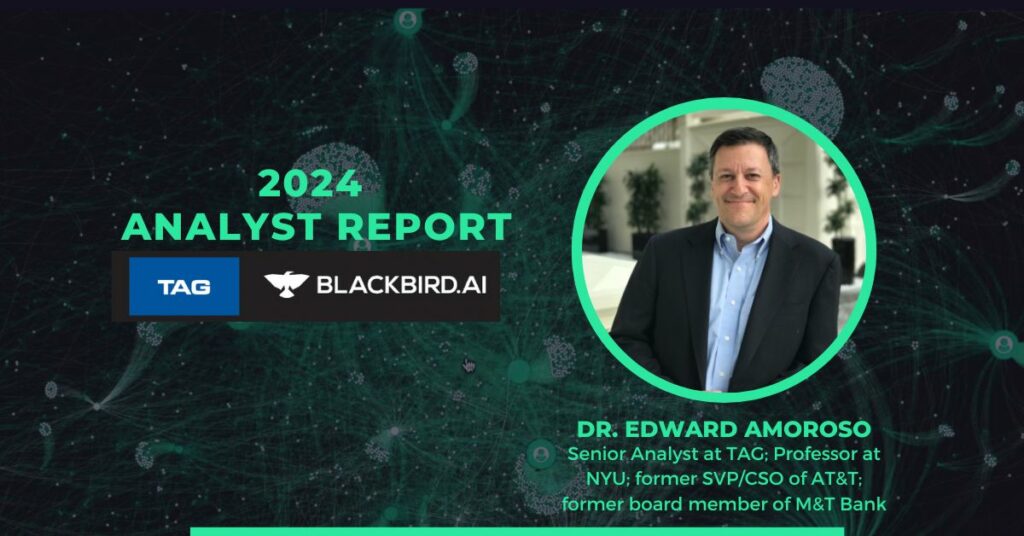How the Blackbird AI Platform Addresses Narrative Attacks in Telecommunications
Telecommunications companies face a new type of security threat in narrative attacks that use narrative attacks to damage their reputation as trusted service providers, says Ed Amoroso, Senior Analyst at TAG Infosphere and Former CISO, AT&T.

The modern growth opportunities in telecommunications are vast, given the ever-increasing need for fast broadband and wireless services. To ensure that such business objectives can be met, cybersecurity teams have had to develop strong protection schemes for infrastructure, and they have been mostly successful in this regard. More recently, however, they have had to develop solutions for a new type of security issue known as a narrative attack.
Learn More: Narrative Attacks: The New Cybersecurity Threat
The way a narrative attack would target telecommunications is that an adversary would make use of either misinformation, which involves factually incorrect statements, or narrative attacks, which involves the deliberate use of bad data to target some individual of group. When such bad information is used against an organization, often on social, great reputational damage can be achieved, and this can have serious implications for the success of the telecom company.
Telecom Reputational Issues
Understanding sample narrative attacks on telecommunications requires reviewing the key reputational issues that such companies will be focused on protecting. We see these as including the following: First, telecom companies are concerned with their public reputation as trusted providers of network services to businesses, citizens, families, and other buyers. Trust is a key reputational issue that must be ensured.
Second, telecom companies are concerned with their reputation as employers since they tend to be larger organizations with massive bases of staff, consultants, and other stakeholders. As such, the reputation of telecom firms as dependable employers and members of the community is also a key issue that executives in this industry will go to great lengths to protect from attack.
And finally, we see regulatory and government-related interactions as being a key reputational issue for telecom companies. Historically, we’ve seen reports of service providers being accused of sharing inappropriately with intelligence agencies – and whether this is true or not, the reputational damage of any reporting in this area can be considerable. As such, this aspect of a telecom company’s reputation must be addressed.
Typical Narrative Attacks on Telecom
The various reputational issues listed above provide a good means for describing the types of narrative attacks that might be expected in this sector. The first issue of service providers’ trustworthiness with buyers might be attacked by false or misleading stories of unfair practices, customer bullying, or otherwise untrustworthy behavior by some targeted company. This could involve false social media posts, videos, or other means.
The second issue is a telecom company’s reputation as an employer, which could be targeted by misinformation about pending layoffs or by creating false or misleading narratives about the effects of individuals who might have been unfairly treated by a large carrier. These could also be narrative attacks on social media, and whether true or not, they would likely spread quickly, especially if the fake narrative shows particular harm to a person or family.
Finally, the issue of telecom companies being targeted for interactions with government entities would involve narrative attacks accusing service providers of sharing inappropriately. It would be easy to concoct such attacks using false or misleading information that could twist fully legal actions with flat-out fabrications. These types of attacks would be consumed by anyone who is suspicious of industry and government coordination.
Need help protecting your organization?
Book a demo today to learn more about Blackbird.AI.
Learn More: Business Case: Why Cybersecurity Leaders and CISOs Need Narrative Risk Intelligence
Addressing Narrative Attacks with Blackbird.AI
As one might expect, very little can be done to stop bad actors from posting false or misleading information on social media. However through an active monitoring program using platforms such as Blackbird.AI, organizations can identify when a narrative attack has occurred and take steps to immediately eliminate narrative blindspots, elevate narrative discovery, automate risk identification, and detect narrative attacks for correction with stakeholders.
It is thus recommended that telecom companies consider engaging with security solution providers such as Blackbird.AI to put in place a program of narrative attack risk reduction. Without such protection, it is entirely possible that the types of attacks described above could easily occur. Buyers are advised to be in touch with Blackbird.AI to learn how their platform can reduce this risk through a range of narrative attack controls.
To learn more about how Blackbird.AI can help you in these situations, contact us here.
TAG Cyber •
TAG enables enterprise organizations, vendors, governments, and investors to address the most critical challenges in cybersecurity.
TAG enables enterprise organizations, vendors, governments, and investors to address the most critical challenges in cybersecurity.



